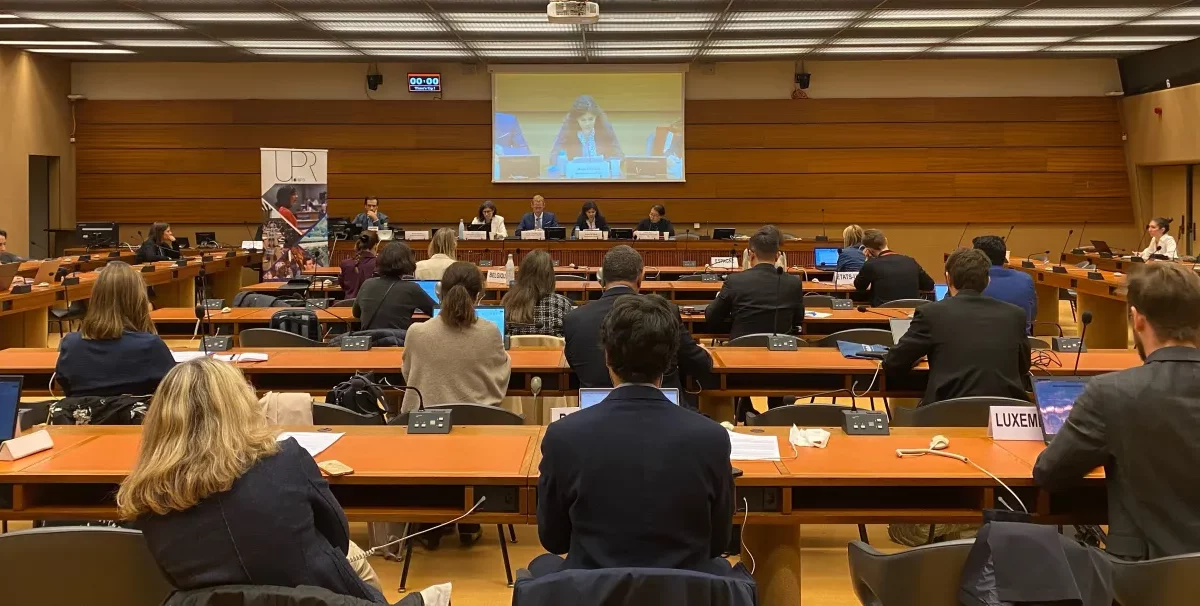Lebanon is facing its fourth Universal Periodic Review (UPR) in November 2025, a critical moment that we can leverage to report on the state of digital rights in the country. At a time when the internet infrastructure is still recovering from Israel’s devastating war and as online freedoms face further restrictions, SMEX resorts to the UPR to advocate for meaningful digital rights reforms before the UN Human Rights Council.
“Lebanon’s participation in this UPR is an opportunity for civil society to discuss these issues directly with other member states and the Lebanese government,” said Mohamad Najem, SMEX’s Executive Director.
As the leading digital rights organization in Lebanon, SMEX presented two submissions to the UPR, one with Access Now and another with the Association of Progressive Communications (APC). The submissions provide key recommendations to protect and advance digital rights in Lebanon.
What is the UPR?
Every 4.5 years, the UPR puts UN Member States under the spotlight of the Human Rights Council. It’s a peer-review process where states are held accountable for their human rights record and where civil society can try to hold governments accountable. SMEX has taken part in Lebanon’s 2015 and 2021 reviews with submissions centered around privacy and data protection.
This fourth review comes at a particularly urgent time. It follows Israel’s destruction of critical internet infrastructure during the 2024 war and the Lebanese state’s growing tendency to restrict freedom of expression, threatening online discourse. Additionally, the country’s legal framework regarding digital rights remains severely outdated.
According to a Human Rights Watch’s July 2025 submission to the UPR, Lebanon has “failed to make sufficient progress on several recommendations” from the previous year. Today, the formation of a new government and the election of a president after a two-year vacuum creates an opportunity to advocate for change and better safeguards for digital rights.
In the joint stakeholder report, SMEX and APC spotlight Lebanon’s lack of adherence to the 297 recommendations of the previous UPR, of which it only supported 179 and failed to submit a mid-term report.
Despite some limited progress, Lebanon’s digital rights protection framework remains inadequate. Currently, laws in Lebanon that protect digital rights are little to nonexistent, and other provisions like the Publications Law of 1962 and the Audiovisual Law of 1994 remain outdated.
Although the government has taken feeble measures to adopt new safeguards, like the Right to Access Information Law in 2017 and Law No. 81/2018 on Electronic Transactions and Personal Data, as well as the launch of the “Digital Transformation Strategy,” these measures are yet to be implemented and still lack the robust privacy protections compliant with international privacy standards.
What were SMEX’s key recommendations to Lebanon in the UPR?
In the separate submissions by SMEX with APC and Access Now, we provided recommendations around different categories including but not limited to data protection and privacy, freedom of expression, digital inclusion and connectivity, technology facilitated gender-based violence (TFGBV), and the protection of marginalized groups.
Here are some of the key recommendations presented, urging the Lebanese government to:
- Introduce a new robust data protection legal framework, aligned with international standards and best practices.
- Ensure that any media regulation is in full compliance with international freedom of expression standards.
- Abolish articles criminalising libel, slander and defamation (including articles 292, 383-386, 388, 398, 474, 582 and 584 of the Penal Code), replacing them with civil defamation provisions that do not carry prison sentences.
- Update Telecommunications Law No. 431 as part of the development of a robust governance framework for the telecoms sector and activate the Telecommunications Regulatory Authority with its necessary independence.
- Uphold the right to a fair trial and ensure due process and judicial integrity when investigating or prosecuting possible online activities that may constitute a crime and are not protected by international law.
- Guarantee journalists’ right to work freely, protect their sources, and ensure their safety from both physical and legal threats;
- Implement transparent and inclusive mechanisms for public consultations with civil society organisations on plans to increase internet access, as mentioned above, and enable the more effective involvement of civil society in the preparation of policies.
- Ensure that human rights defenders, women’s rights defenders and journalists are able to conduct their work and activities freely online and offline.
- Provide adequate funding and resources to ensure that victims/survivors of Technology Facilitated Gender Based Violence (TGFBV) have a variety of options when seeking support, including legal and non-legal responses. These responses should allow victims/survivors time to consider their options and should not require engagement with the legal system in all instances.
SMEX’s vision extends beyond Lebanon and has always been for everyone, especially residents of West Asia and North Africa, to access and freely engage with the internet and other online spaces without fear of censorship, surveillance, or repercussions.
Our participation in Lebanon’s UPR serves as a call against the state’s ongoing failure to modernize its legal frameworks and digital infrastructure. These failures have left people navigating the online world under constant threats and deteriorating connectivity.
With that in mind, we strongly urge the relevant Lebanese authorities to take our UPR recommendations seriously, not as abstract policy advice, but as a framework used to take tangible steps toward the protection of our freedoms, ensuring that digital rights are safeguarded and recognized.
Read our submission with Access Now.
Read our submission with APC.
Featured image by UPR Info.



